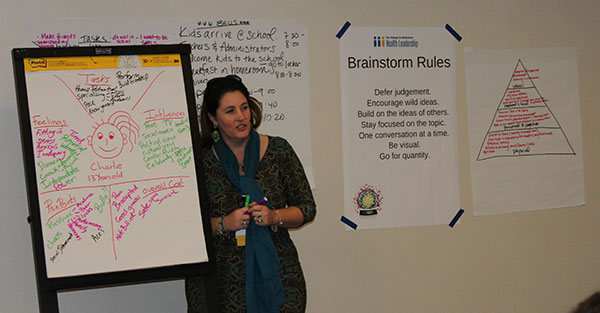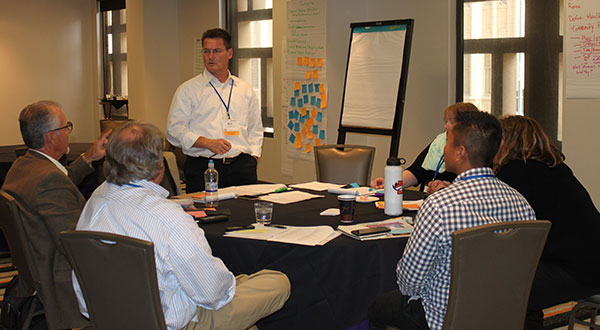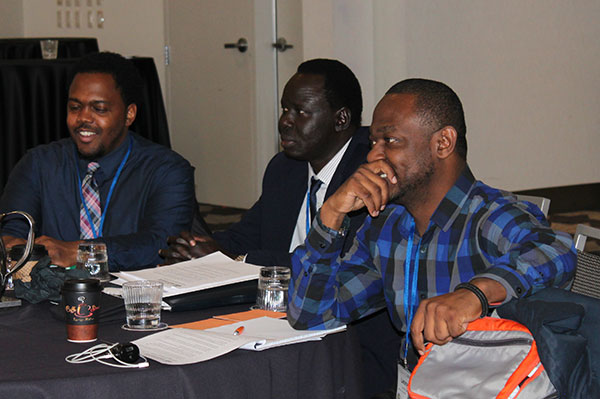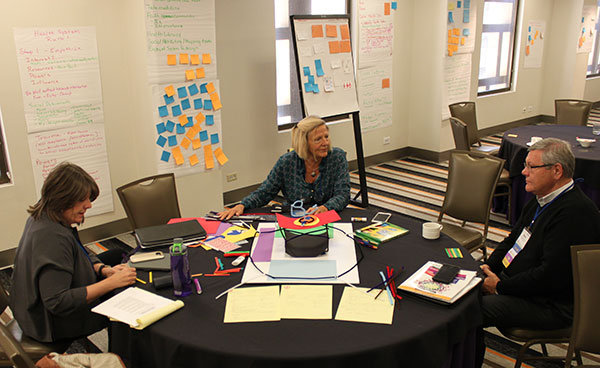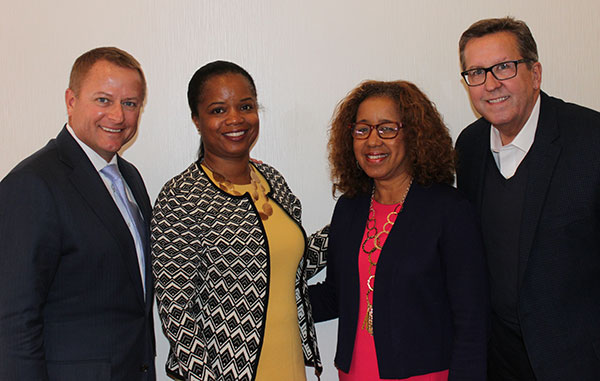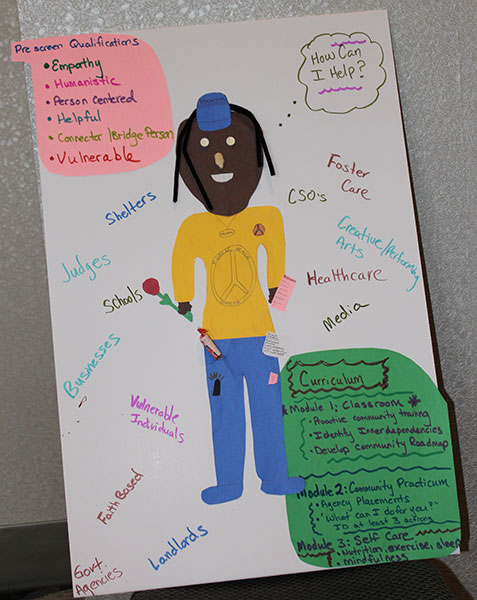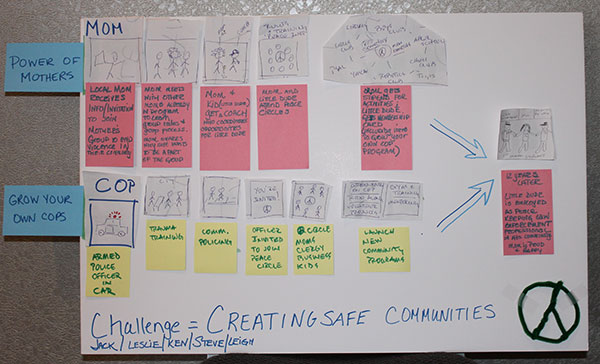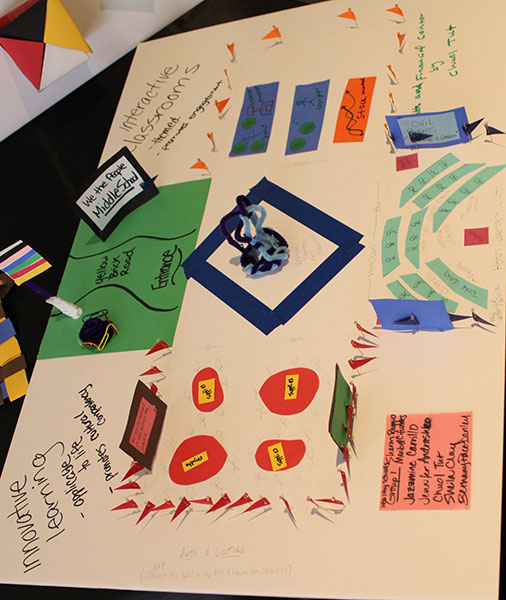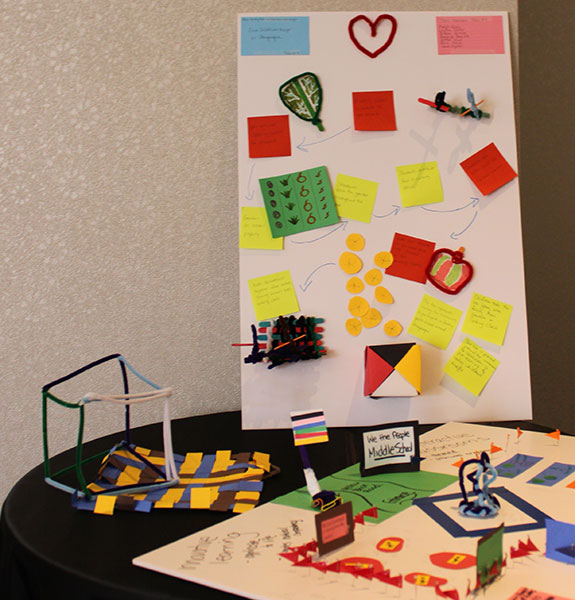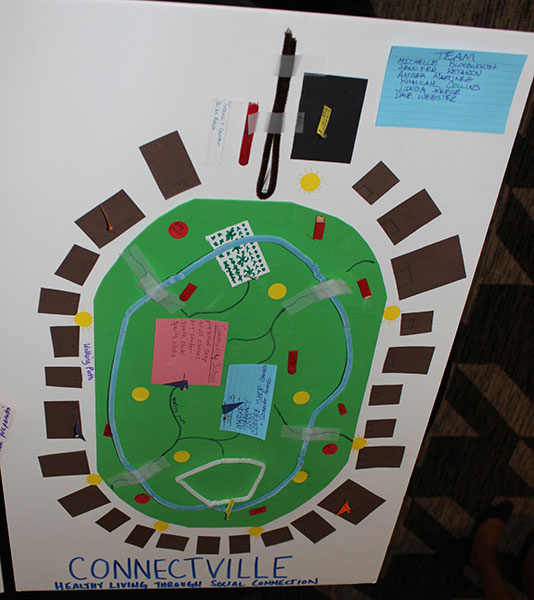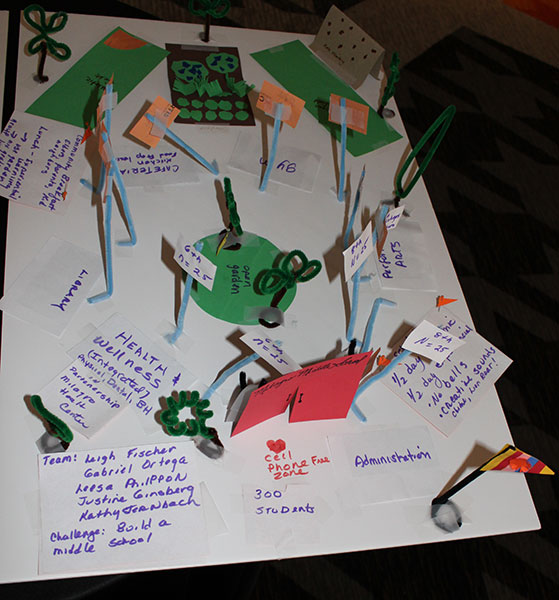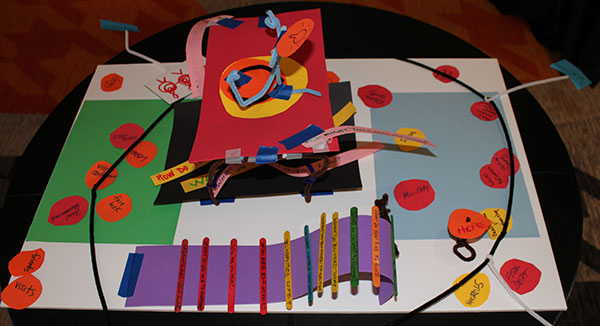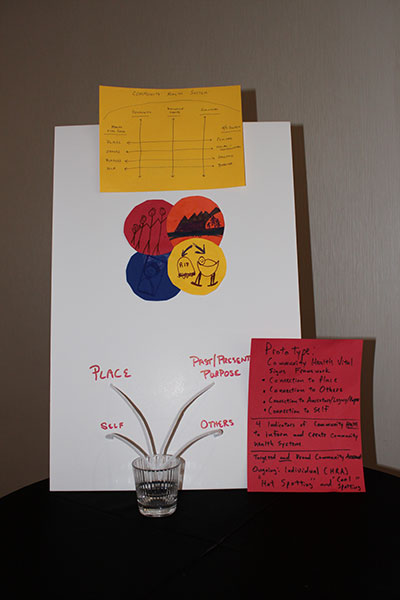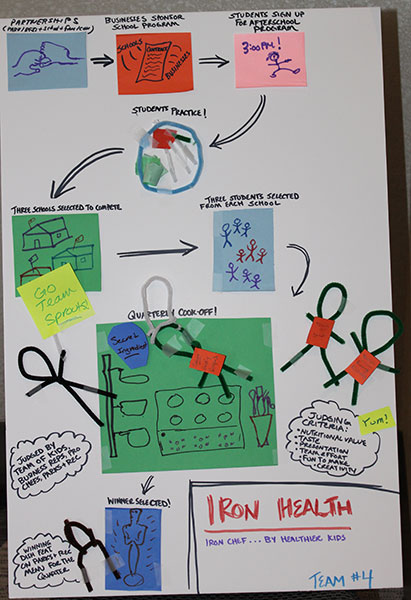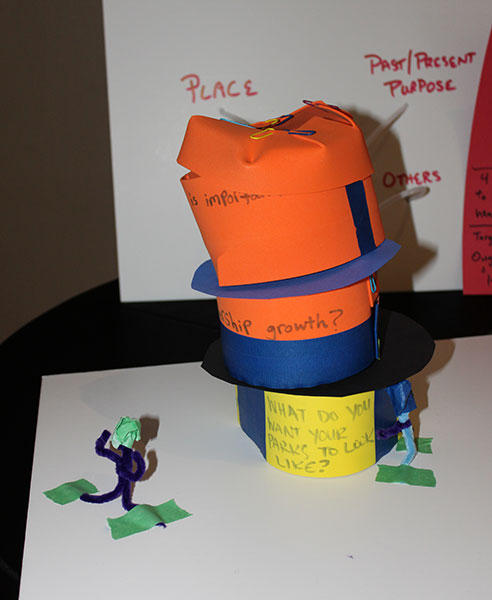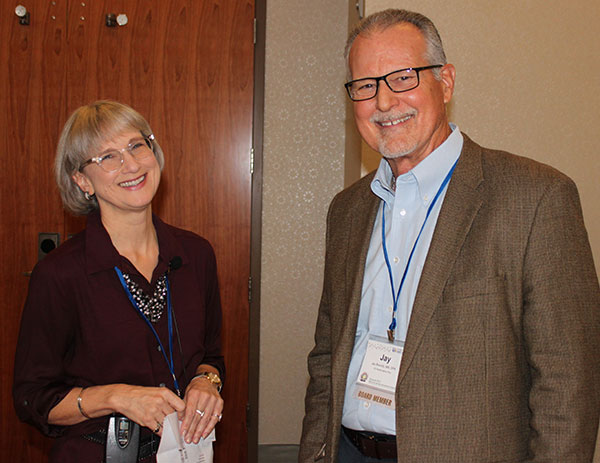| TUESDAY, OCTOBER 17 | ||
| 7:30 – 8:30 a.m. | Breakfast Buffet | |
| 8:30 a.m. | Why Summit? Setting the Stage for Opportunity and Action Gina Lasky, PhD, MAPL, President, The College for Behavioral Health Leadership | |
| 9:00 a.m. | Human Centered Design Thinking: Innovation in Challenging Times Amy Schwartz, PhD, Empathic Innovation Why should we introduce a new way to think about opportunities and solutions? There are numerous reasons that could be listed, but overarching reasons are that Design Thinking achieves all these advantages at the same time:It is a human-centered process that starts with user data, creates design artifacts that address real and not imaginary user needs, and then tests those artifacts with real users;It leverages collective expertise and establishes a shared language and buy-in amongst your team; andIt encourages innovation by exploring multiple avenues for the same problem.“Design Thinking is neither art nor science nor religion. It is the capacity, ultimately, for integrative thinking.” – Tim Brown, IDEO | |
| 9:45 a.m. | Design Thinking Lab Teams It’s not a College Summit if we aren’t working together! Participants will divide into Design Thinking Lab teams to address right-sized innovation opportunities over the course of the program. We’ll take a few moments to group ourselves and share brief introductions. “We must design for the way people behave, not for how we would wish them to behave.” ? Donald A. Norman, Living with Complexity | |
| 10:00 – 11:45 a.m. | Creating Innovation with Design Thinking: Learning How to Begin Design-thinking successes have demonstrated that this hands-on, user-centric approach to problem solving can lead to meaningful innovation, and innovation can lead to differentiation and a competitive advantage. This hands-on, user-centric approach is defined through the broad areas of understanding, exploring, and materializing. The process entails recursive phases: empathize, define, ideate, prototype, and implement. | |
| 11:45 a.m. – 12:30 p.m. | Lunch | |
| 12:45 – 2:45 p.m. | Design Thinking Lab Groups 1 – 5 With guided direction, each Design Thinking Lab (DTL) team will discuss expansively and creatively about how to apply behavioral health expertise to a “big system” using human centered design processes. Together they will develop knowledge about the “user,” pinpoint users’ needs and begin to highlight opportunities for innovation, and brainstorm a range of crazy, creative ideas that could address the unmet needs identified.Design Thinking Lab Groups 6 – 10 Design Thinking Lab (DTL) teams will meet with representatives from two innovative organizations who have addressed challenges in different ways. Each team will share information not included in written materials and allow time for discussion with the larger group. The presenters will also be available for “design consultation” with each team as they begin to tackle the topic in front of them. Ending Youth Homelessness in Austin by 2020 Wendy Varnell, LCSW, LifeWorks Elizabeth Schoenfeld, PhD, LifeWorksWhole Health, LLC Sharon Raggio, LPC, LMFT, MBA, Mind Springs Health Patrick Gordon, MPA, Rocky Mountain Health Plans | |
| 2:45 p.m. | Networking Break Sponsored by Abt Associates | |
| 3:00 – 5:00 p.m. | Design Thinking Lab Groups 6 – 10 With guided direction, each Design Thinking Lab (DTL) team will discuss expansively and creatively about how to apply behavioral health expertise to a “big system” using human centered design processes. Together they will develop knowledge about the “user,” pinpoint users’ needs and begin to highlight opportunities for innovation, and brainstorm a range of crazy, creative ideas that could address the unmet needs identified.Design Thinking Lab Groups 1 – 5 Design Thinking Lab (DTL) teams will meet with representatives from two innovative organizations who have addressed challenges in different ways. Each team will share information not included in written materials and allow time for discussion with the larger group. The presenters will also be available for “design consultation” with each team as they begin to tackle the topic in front of them. Ending Youth Homelessness in Austin by 2020 Wendy Varnell, LCSW, LifeWorks Elizabeth Schoenfeld, PhD, LifeWorksWhole Health, LLC Sharon Raggio, LPC, LMFT, MBA, Mind Springs Health Patrick Gordon, MPA, Rocky Mountain Health Plans | |
| 5:30 p.m. | New Member Forum: Introducing the College Attention new members! You are invited for conversation prior to the evening reception. Come meet your colleagues, help us meet you, and learn more about our work. | |
| 6:00 – 7:00 p.m. | Networking Reception Collaborate and enjoy! Join colleagues at the close of the business day for hors d’oeuvres and ongoing conversation before heading out for dinner and to explore the Denver neighborhood. | |
| WEDNESDAY, OCTOBER 18 | ||
| 7:30 – 8:30 a.m. | Breakfast Buffet | |
| 8:30 a.m. | Creating Innovation with Design Thinking: Prototypes and User Looks The beauty of design thinking is that it is scalable. While it can be applied to improve small functions like improving no-show rates for medical appointments, it can also be applied to design disruptive and transformative solutions to societal issues. Critical steps follow the brainstorming stage – developing the prototype or model for the innovation, testing the idea, and making changes based on feedback. | |
| 9:30 a.m. | What is Innovative Leadership? Steve Scoggin, PsyD, MDiv, LPC, CareNet, Inc., a subsidiary of Wake Forest Baptist Health | |
| 10:00 a.m. – 12:00 p.m. | Design Thinking Lab Groups 1 – 5 Design Thinking Lab (DTL) teams will meet with representatives from two innovative organizations who have addressed challenges in different ways. Each team will share information not included in written materials and allow time for discussion with the larger group. The presenters will also be available for “design consultation” with each team as they tackle the topic in front of them. Partners 4 Health – Detroit, MI Sheilah Clay, MA, Neighborhood Service Organization Greg Moore, Esq., Dickinson Wright, PLLC Contessa Rudolph, MSA, Partners 4 HealthAddressing the Health of Men and Boys Prevention InstituteDesign Thinking Lab Groups 6 – 10 Building on the work from Tuesday, DLT teams build, draw, or otherwise create a representation of their innovation for feedback on feasibility and necessary changes, addressing the necessary leadership skills and responsibilities necessary for the innovation to get underway. “User Looks,” the final stage in the design process, puts the innovation in front of others to verify if it achieves goals. | |
| 12:00 – 1:30 p.m. | Awards Recognition Luncheon Timothy J. Coakley Award for Behavioral Health Leadership King Davis Award for Leadership in Promoting Diversity and Reducing Disparities Barton Distinguished Member Award Saul Feldman Lifetime Achievement Award | |
| 1:30 – 3:30 p.m. | Design Thinking Lab Groups 6 – 10 Design Thinking Lab (DTL) teams will meet with representatives from two innovative organizations who have addressed challenges in different ways. Each team will share information not included in written materials and allow time for discussion with the larger group. The presenters will also be available for “design consultation” with each team as they tackle the topic in front of them. Partners 4 Health – Detroit, MI Sheilah Clay, MA, Neighborhood Service Organization Greg Moore, Esq., Dickinson Wright, PLLC Contessa Rudolph, MSA, Partners 4 HealthAddressing the Health of Men and Boys Prevention InstituteDesign Thinking Lab Groups 1 – 5 Building on the work from Tuesday, DLT teams build, draw, or otherwise create a representation of their innovation for feedback on feasibility and necessary changes, addressing the necessary leadership skills and responsibilities necessary for the innovation to get underway. “User Looks,” the final stage in the design process, puts the innovation in front of others to verify if it achieves goals. | |
| 3:30 – 4:30 p.m. | Learnings and Reflections of Innovations and the Design Thinking Process Amy Schwartz, PhD, Empathic Innovation Lynda Frost, JD, PhD, Hogg Foundation for Mental Health Jay Roundy, DPA, P2 Performance Plus | |
| 4:30 p.m. | Summit Adjourns |
Design Thinking Presentation – Dr. Amy Schwartz, Empathic Innovation
- An Introduction to Design Thinking
- Design Thinking: Empathize, Define, Ideate
- Design Thinking: Prototype & Test
- Tools to Empathize, Define, Ideate
Information from Exemplars
- Ending Youth Homelessness in Austin by 2020: Lifeworks
- PRIME Project: Mind Springs Health/Rocky Mountain Health Plans
- Business Summary: Partners4Health
- Back to Our Roots: Catalyzing Community Action for Mental Health and Wellbeing: Prevention Institute
- Making Connections for Mental Health and Wellbeing for Men and Boys in the US: Prevention Institute
- Medical High Utilization: Prevention Institute
Additional Resources Shared by Others
Learn More About Human-Centered Design Thinking
For over 30 years, Dr. Amy Schwartz has used her training as a cognitive psychologist to humanize technology and has applied her expertise in Human-Centered Design across a wide range of challenges and a multitude of domains. For the last 20 years, Amy worked at IDEO, the world-renowned design and innovation firm, where she founded the design research group in the Chicago studio, served as the global design lead for the IDEO health practice, and led the design research for some of IDEO’s most innovative and successful designs including the award-winning Lifeport Kidney Transporter (which won the IDSA Design of the Decade award and is in the permanent collection of New York’s Museum of Modern Art), Medtronic StealthStation surgical navigation system, Bayer Contour glucose meters, and Sherwin Williams’ ColorSnap in-store color selection system. She has worked with a wide variety of clients from startups, to industry giants like Baxter, Eli Lilly, and Ford as well as clients in the governmental and public sectors such as the Department of Health and Human Services and the Robert Wood Johnson Foundation. Amy excels in helping clients and design teams find unmet needs with “design energy” to frame problems in new ways that inspire innovative design solutions in complex multi-stakeholder ecosystems. Learn more about Amy and her work.
SHEILAH P. CLAY is the President and CEO of Neighborhood Service Organization (NSO). This Detroit-based $24 million nonprofit human service organization strives to improve lives and communities in southeast Michigan. NSO provides support and mental health treatment services for older adults, children and adults with intellectual and developmental disabilities, and homeless adults, in addition to integrated health services. NSO also provides psychiatric crisis intervention and stabilization, youth leadership, violence prevention, workforce development, supportive housing development, and training services to individuals and families. NSO’s historic Bell Building, opened in 2012, is the largest permanent supportive housing development in the State of Michigan and is home to 155 formerly homeless adults. Ms. Clay is a member of various local boards including Partners 4 Health, Michigan League for Public Policy, Opportunity Resource Fund, Judith D. Jackson Scholarship Fund and a national board, Leadership Women. She is the recipient of numerous awards, including the Shining Light Eleanor Josaitis Unsung Hero Award, the Nonprofit Leadership Award from the Community Foundation for Southeastern Michigan, Board Service Award from the Federal Reserve Bank of Chicago-Detroit Branch, and the Michigan Chronicle’s Women of Excellence and Who’s Who in Black Detroit. She is also an active member of Alpha Kappa Alpha Sorority, Inc., The Links, Inc., and Word of Faith International Christian Center. This Detroit native is a graduate of Spelman College in Atlanta, Georgia and Wayne State University, Leadership Detroit, and Leadership America.
CONTESSA RUDOLPH, MSA, is a public health professional with 15+ years of increasing responsibility and experience in health administration, promotion, wellness, and disease management programs. She has significant experience implementing and managing diverse projects (population health, obesity prevention, infant mortality, child safety, employee wellness, healthy community engagement and design, supplemental nutrition) in health and human services. Ms. Rudolph has extensive knowledge of principles and practices of services related to public health and possesses a familiarity with complex health problems, disease etiologies, and preventive strategies. In her current position, Ms. Rudolph manages the day-to-day operations of Partners 4 Health, a start-up non-profit human services agency designed to develop, implement, and evaluate policy, system, and environmental interventions to support healthy lifestyles. Her enthusiasm for taking on new challenges has led to renewed customer relationships and a reputation for project success. Ms. Rudolph is also experienced in researching, managing, and writing grant programs.
GREG MOORE, JD, co-chairs Dickinson Wright’s Behavioral Health Care Practice Group. Mr. Moore has been a consultant and practicing health care attorney since 1991. During his entire career, he has focused on representing and counseling providers of all types and sizes including behavioral health care provider companies, facilities, and networks. He has been recognized as a thought leader and innovator when it comes to the integration of behavioral and physical health care. With 25 years of experience serving clients in the industry, his practice covers the full spectrum of regulatory, transactional, and litigation services. In January 2009, Mr. Moore created a Behavioral Health Care Law focused Practice Group, the first of its kind in a national law firm. The group continues to guide their behavioral health care clients through the highly nuanced Patient Protection and Affordable Care Act. The group continues to be leaders in educating and counseling clients as parity and the integration of behavioral health and physical health take center stage.
WENDY VARNELL, LCSW, is Chief Strategy Officer at LifeWorks. She is responsible for planning and implementing agency strategic initiatives and makes recommendations for programmatic and operational improvement. In collaboration with the Board of Governors, Ms. Varnell develops agency research projects and ensures execution. She manages a variety of high-impact special projects. In addition, she hires, trains and supervises the Chief Program Officer, Director of Research & Evaluation, the Chief Compliance Officer and the Director of Public Grants. She represents LifeWorks at national conferences, professional associations, relevant boards/committees, and other local initiatives. Ms. Varnell was the 2010 Austin Area Research Organization McBee Fellow, served on the Waterloo Counseling Board from 2009-2012, was a member of Leadership Austin, and received the 2003 Field Instructor of the Year award from the University of Texas at Austin School of Social Work. She is currently on the board of The College for Behavioral Health Leadership, a national organization focused on the development of leadership in the mental health and substance use prevention and treatment fields. Ms. Varnell has a Master’s of Science in social work from The University of Texas at Austin and a bachelor’s of arts in general studies, with equal emphasis in psychology, sociology and child development and family relations from The University of Arizona at Tucson. She is a Licensed Clinical Social Worker and has worked at LifeWorks since 1992.
DR. ELIZABETH SCHOENFELD earned her PhD in Human Development and Family Sciences at The University of Texas at Austin and has over 10 years of experience in research design, evaluation, and statistical modeling. She serves as the Director of Research & Evaluation at LifeWorks, where she manages a variety of high-impact special projects, conducts research on LifeWorks’ target population, oversees the development of agency metrics for its 17 programs, and utilizes data to help guide the strategic vision of the organization. Dr. Schoenfeld has presented her work at both national and international conferences, and she has published multiple articles in peer-reviewed journals. Her work has been featured in U.S. News & World Report, Psychology Today, and the Hogg Foundation’s Mental Health Daily, among other notable outlets.
Summit 2017 – Shake Up Your Snow Globe: Bold Leadership for Changing Times – focused on learning and practicing human centered design thinking. Led by Dr. Amy Schwartz, Empathic Innovation, participants formed into 10 design lab teams and spent concentrated time together using the framework of human-centered design to create and prototype an innovation to impact health and wellbeing.
We redesigned components of a US city to increase the focus on health and wellness, using the expertise we bring in behavior change to improve a number of “systems” in our community. This is a real city – diversified ethnically, racially, and socio-economically. Teams addressed five different design challenges: a middle school, a health neighborhood (built environment), community police department, food and substance landscape, and health systems. Each team focused on what a “day in the life” looked like for part of the population now and what they wanted it to be in a new, healthier future.
Included below are photos from Denver including images of the resulting prototypes from design teams.
